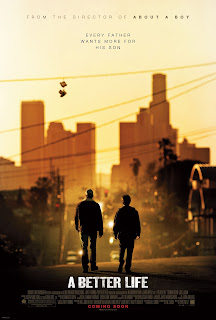A Better Life
When the Screen Actors' Guild nominations were announced, the surprise was that Demian Bechir (excellent as Fidel Castro in Steven Soderbergh's Che) was nominated for Best Actor for his work in A Better Life. I dutifully have caught up with it on DVD, and it's a terrific, unshowy job in a unshowy film that speaks volumes about the lives of undocumented aliens in the U.S.
Directed by Chris Weitz, whose career has followed an interesting path (who could imagine a small, intense film like this one could be made by the man who did both American Pie and a Twilight movie?), the film is firstly impressive in its integrity. This film is about Mexican immigrants who work as day laborers and their daily struggles, but instead of the typical Hollywood solution--making the protagonist a white character who works on their behalf--Weitz chooses to tell the story from the ground up.
Bechir stars as a undocumented worker living in Los Angeles. He has it better than most, as another gardener has taken him on as a steady assistant, so he doesn't have to line up in parking lots waiting for a possible job. He has a small house, and a 14-year-old son who goes to school and is already losing his Spanish. His boss urges Bechir to buy his truck (thus buying his business), so he borrows the money from his sister. But on the first day of his new, better life, his truck is stolen.
This plot twist gives the film a template that follows Vittoria De Sica's Bicycle Thief, but that film was told in a completely different style and didn't have the added element of the character not only seeking his means of work, but also understanding than any misstep (he doesn't have a driver's license, for example) will mean his deportation.
After watching the film I felt like I could understand how these people lived. Julian's life is also fraught, as he is close to the age of being seduced by vicious gangs (he dates a girl who is in the family of these freakishly tattooed and muscled men, who know they will not live long). While attending a traditional Mexican radio, he scoffs at the sombreros and mariachi songs, but never do we feel that the connection between father and son has been broken.
This is a fine film, perhaps the best narrative film I've seen on a very complicated issue.
Directed by Chris Weitz, whose career has followed an interesting path (who could imagine a small, intense film like this one could be made by the man who did both American Pie and a Twilight movie?), the film is firstly impressive in its integrity. This film is about Mexican immigrants who work as day laborers and their daily struggles, but instead of the typical Hollywood solution--making the protagonist a white character who works on their behalf--Weitz chooses to tell the story from the ground up.
Bechir stars as a undocumented worker living in Los Angeles. He has it better than most, as another gardener has taken him on as a steady assistant, so he doesn't have to line up in parking lots waiting for a possible job. He has a small house, and a 14-year-old son who goes to school and is already losing his Spanish. His boss urges Bechir to buy his truck (thus buying his business), so he borrows the money from his sister. But on the first day of his new, better life, his truck is stolen.
This plot twist gives the film a template that follows Vittoria De Sica's Bicycle Thief, but that film was told in a completely different style and didn't have the added element of the character not only seeking his means of work, but also understanding than any misstep (he doesn't have a driver's license, for example) will mean his deportation.
After watching the film I felt like I could understand how these people lived. Julian's life is also fraught, as he is close to the age of being seduced by vicious gangs (he dates a girl who is in the family of these freakishly tattooed and muscled men, who know they will not live long). While attending a traditional Mexican radio, he scoffs at the sombreros and mariachi songs, but never do we feel that the connection between father and son has been broken.
This is a fine film, perhaps the best narrative film I've seen on a very complicated issue.



Comments
Post a Comment